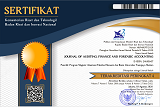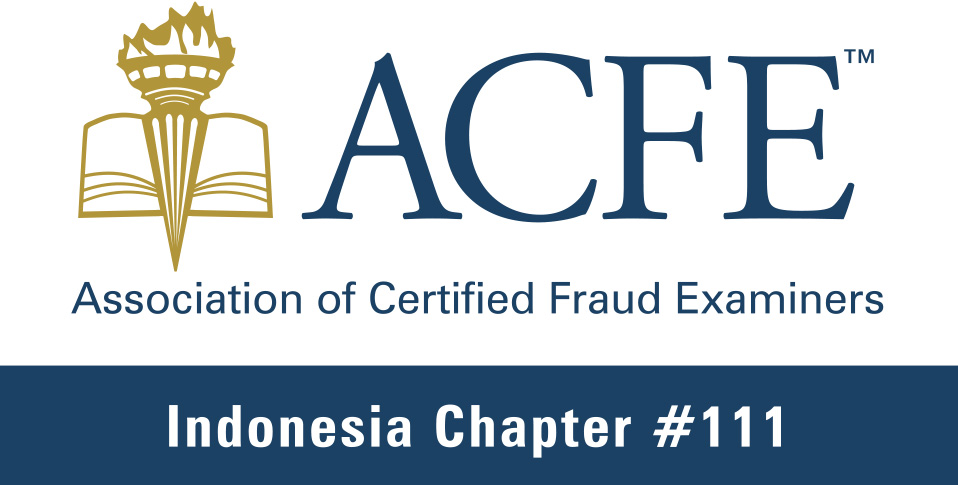Pre-Post IFAS 72 Adoption and Earnings Management: Comparative Evidence From Indonesian Corporate Sectors
Abstract
This study examines the impact of the mandatory implementation of IFAS 72 on earnings management in telecommunications, construction, and real estate companies in Indonesia. This study uses a quantitative approach with a sample of 120 companies for the observation period of 2016–2023. Earnings management is measured through discretionary accruals using the modified Jones model. The results show that the mandatory implementation of IFAS 72 negatively correlated with earnings management but did not significantly affect it. The analysis also reveals no significant difference in earnings management levels before and after IFAS 72 mandatory implementation. This study contributes to the literature by providing empirical evidence regarding the impact of IFAS 72 implementation on accounting quality, particularly earnings management practices. The implications of this study can provide a reference for standard setters and regulators to evaluate the effectiveness of IFAS 72 implementation in Indonesia.
Keywords
Full Text:
PDFReferences
Adhikari, A., Bansal, M., & Kumar, A. (2021). IFRS Convergence and Accounting Quality: India A Case Study. Journal of International Accounting, Auditing and Taxation, 45, 100430. https://doi.org/10.1016/j.intaccaudtax.2021.100430.
Adwan, S., Alhaj-Ismail, A., & Girardone, C. (2020). Fair Value Accounting and Value Relevance of Equity Book Value and Net Income for European Financial Firms during the Crisis. Journal of International Accounting, Auditing and Taxation, 39, 100320. https://doi.org/10.1016/j.intaccaudtax.2020.100320.
Agustrianti, W., Mashuri, A. A. S., & Nopiyanti, A. (2020). Dampak Penerapan IFAS 72 Terhadap Kinerja Keuangan Perusahaan Property, Real Estate and Building Construction Yang Terdaftar Di Bursa Efek Indonesia Tahun 2018-2019. Prociding BIEMA Universitas Pembangunan Nasional Veteran Jakarta, 1, 973–989.
Altaji, F. S., & Alokdeh, S. K. (2019). The Impact of the Implementation of International Financial Reporting Standards No.15 on Improving the Quality of Accounting Information. Management Science Letters, 9(Special Issue 13), 2369–2382. https://doi.org/10.5267/j.msl.2019.7.018.
Alzoubi, E. S. S. (2016). Audit Quality and Earnings Management: Evidence from Jordan. Journal of Applied Accounting Research, 17(2), 170–189. https://doi.org/10.1108/JAAR-09-2014-0089.
Arham, A., Rahman, D. H., & Lisdiyanto, F. (2020). Pemetaan Penelitian Terkait Implementasi IFRS 15 Tentang Pendapatan dari Kontrak dengan Pelanggan. Keberlanjutan : Jurnal Manajemen dan Jurnal Akuntansi, 5(1), 78-90. https://doi.org/10.32493/keberlanjutan.v5i1.y2020.p78-90.
Baig, M., & Khan, S. A. (2016). Impact of IFRS on Earnings Management: Comparison of Pre-Post IFRS Era in Pakistan. Procedia - Social and Behavioral Sciences, 230(May), 343–350. https://doi.org/10.1016/j.sbspro.2016.09.043.
Bao, S. R., & Lewellyn, K. B. (2017). Ownership structure and earnings management in emerging markets—An institutionalized agency perspective. International Business Review, 26(5), 828–838. https://doi.org/10.1016/j.ibusrev.2017.02.002.
Barth, M. E., Landsman, W. R., Lang, M., & Williams, C. (2012). Are IFRS-based and US GAAP-based Accounting Amounts Comparable?. Journal of Accounting and Economics, 54(1), 68–93. https://doi.org/10.1016/j.jacceco.2012.03.001.
Boučková, M. (2015). Management Accounting and Agency Theory. Procedia Economics and Finance, 25(15), 5–13. https://doi.org/10.1016/s2212-5671(15)00707-8.
Boujelben, S., & Kobbi-Fakhfakh, S. (2020). Compliance with IFRS 15 Mandatory Disclosures: An Exploratory Study in Telecom and Construction Sectors. Journal of Financial Reporting and Accounting, 18(4), 707-728. https://doi.org/10.1108/JFRA-10-2019-0137.
Bui, T. H. (2024). Past, Present, and Future of Earnings Management Research. Cogent Business & Management, 11(1), 2300517. https://doi.org/10.1080/23311975.2023.2300517.
Catur, D., Saputra, A., & Alvia, L. (2024). Praktik Manajemen Laba Setelah Penerapan IFAS 72 Pada Sektor Properti Dan Real Estat Di Indonesia. SAMMAJIVA: Jurnal Penelitian Bisnis Dan Manajemen, 2(1), 209–220.
Chen, J. (2025). The impact of IFRS 15 on Revenue and Earnings Quality: Evidence from China. Asian Review of Accounting, 33(3), 523–546. https://doi.org/10.1108/ARA-07-2024-0220.
Christensen, H. B., Hail, L., & Leuz, C. (2013). Mandatory IFRS reporting and changes in enforcement. Journal of Accounting and Economics, 56(2–3), 147–177. https://doi.org/10.1016/j.jacceco.2013.10.007.
de Souza, P. V. S., Gonçalves, R. de S., & Silva, C. A. T. (2022). Impact of IFRS 15 on the Quality of Accruals and Earnings Management of Brazilian Publicly Held Companies. Revista Brasileira de Gestao de Negocios, 24(4), 675–691. https://doi.org/10.7819/rbgn.v24i4.4197.
Dechow, P., Ge, W., & Schrand, C. (2010). Understanding Earnings Quality: A Review of the Proxies, Their Determinants and Their Consequences. Journal of Accounting and Economics, 50(2), 344–401. https://doi.org/10.1016/j.jacceco.2010.09.001.
Dechow, P. M., Sloan, R. G., & Sweeney, A. P. (1995). Detecting Earnings Management. The Accounting Review, 70(2), 193–225.
Eiler, L. A., Miranda-Lopez, J., & Tama-Sweet, I. (2022). The Impact of IFRS on Earnings Management: Evidence from Mexico. Journal of Accounting in Emerging Economies, 12(1), 77–96. https://doi.org/10.1108/JAEE-11-2020-0316.
Firmansyah, A., & Irawan, F. (2018). Adopsi IFRS, Manajemen Laba Akrual dan Manajemen Laba Riil. Assets: Jurnal Akuntansi Dan Pendidikan, 7(2), 81–94. https://doi.org/10.25273/jap.v7i2.3310.
García Lara, J. M., Osma, B. G., & Mora, A. (2005). The Effect of Earnings Management on the Asymmetric Timeliness of Earnings. Journal of Business Finance and Accounting, 32(3–4), 691–726. https://doi.org/10.1111/j.0306-686X.2005.00610.x.
Garrett, K. W. C., Mohamad, S., Shafie, R. Bin, & Sadiq, M. (2020). International Financial Reporting Standards and Earnings Management: Comparative Study of Pre-post Full Convergence of IFRS in Malaysia. Journal of Critical Reviews, 7(2), 85–89. https://doi.org/10.31838/jcr.07.02.17.
Ghofir, A., & Yusuf. (2020). Effect of Firm Size and Leverage on Earning Management. Journal of Industrial Engineering & Management Research, 1(3), 218–225.
Hasan, M. T., & Rahman, A. A. (2020). The Role of Corporate Governance on the Relationship between IFRS Adoption and Earnings Management: Evidence from Bangladesh. International Journal of Financial Research, 11(4), 329-345. https://doi.org/10.5430/ijfr.v11n4p329.
Ho, L.-C. J., Liao, Q., & Taylor, M. (2015). Real and Accrual-Based Earnings Management in the Pre- and Post-IFRS Periods: Evidence from China. Journal of International Financial Management & Accounting, 26(3), 294–335. https://doi.org/10.1111/jifm.12030.
Jeanjean, T., & Stolowy, H. (2008). Do Accounting Standards Matter? An Exploratory Analysis of Earnings Management Before and After IFRS Adoption. Journal of Accounting and Public Policy, 27(6), 480–494. https://doi.org/10.1016/j.jaccpubpol.2008.09.008.
Khamis, A. M. (2016). Perception of Preparers and Auditors on New Revenue Recognition Standard (IFRS 15): Evidence From EgyptJurnal Dinamika Akuntansi dan Bisnis, 3(2). https://doi.org/10.24815/jdab.v3i2.5383.
KPMG. (2018). Disclosures Under IFRS 15. February, 1–16.
Lestari, A. D., & Khomsiyah, K. (2023). Pengaruh Kinerja Lingkungan, Penerapan Green Accounting, dan Pengungkapan Sustainability Report Terhadap Nilai Perusahaan. Jurnal Ekonomi Bisnis, Manajemen dan Akuntansi (JEBMA), 3(3), 514–526. https://doi.org/10.47709/jebma.v3i3.2799.
Marco, T., Carlo, R., Giorgia, M., Niccolò, P., & Marco, P. (2019). Does the IFRS 15 Impact Earnings Management? Initial Evidence from Italian Listed Companies. African Journal of Business Management, 13(7), 226-238. https://doi.org/10.5897/ajbm2018.8735.
Mohamed Amer, A. M., Azimli, A., & Wole Adedokun, M. (2024). Can IFRS Adoption Mitigate Earnings Management in An Emerging Market?. Heliyon, 10, 1-17. https://doi.org/10.1016/j.heliyon.2024.e38226.
Mongrut, S., & Winkelried, D. (2019). Unintended Effects of IFRS Adoption on Earnings Management: The Case of Latin America. Emerging Markets Review, 38(November 2018), 377–388. https://doi.org/10.1016/j.ememar.2018.11.004.
Mubarika, N. R., & Handayani, Rr. S. (2022). Value Relevance of Accounting Information from IFAS 72. Jurnal Akuntansi Dan Keuangan, 24(1), 1–9. https://doi.org/10.9744/jak.24.1.1-9.
Napier, C. J., & Stadler, C. (2020). The Real Effects of A New Accounting Standard: The Case of IFRS 15 Revenue from Contracts with Customers. Accounting and Business Research, 50(5), 474–503. https://doi.org/10.1080/00014788.2020.1770933.
Ogunode, O. A., & Salawu, R. O. (2021). Revenue recognition dilemma under international financial reporting standard (ifrs 15): Perspectives from key impacted firms in nigeria. Universal Journal of Accounting and Finance, 9(5), 916–926. https://doi.org/10.13189/ujaf.2021.090503.
Putri, S. E., & Panggabean, R. R. (2020). The Effects of Corporate Governance, Firm Size, Profitability, and Growth Opportunities on the Value Relevance of Accounting Earnings – A Study of the Indonesia Stock Exchange. Ultimaccounting : Jurnal Ilmu Akuntansi, 12(2), 174–193. https://doi.org/10.31937/akuntansi.v12i2.1702.
PWC. (2016). An Accounting Change with Profound Impacts for Communications Operators – from The P & L to Operations , Pricing and Marketing. June 2016.
PwC. (2017). PSAK 72 Revenue from Contracts with Customers: Accounting Outlook.
Rahmaningtyas, F., & Mita, A. F. (2018). IFRS Adoption, Earnings Management and Investor Protection in Several Asian Countries. 55(Iac 2017), 118–122. https://doi.org/10.2991/iac-17.2018.21.
Saam, N. J. (2007). Asymmetry in Information Versus Asymmetry in Power: Implicit Assumptions of Agency Theory?. Journal of Socio-Economics, 36(6), 825–840. https://doi.org/10.1016/j.socec.2007.01.018.
Santy, P., Tawakkal, T., & Pontoh, G. T. (2016). The Impact of IFRS Adoption on Earnings Management in Banking Companies in Indonesia Stock Exchange. Jurnal Akuntansi Dan Auditing, 13(2), 176–190. https://doi.org/10.14710/jaa.13.2.176-190.
Siwi, T. P., & Kartika, A. (2022). Analisis perbandingan kinerja keuangan berdasarkan IFAS 23 dan IFAS 72 mengenai pendapatan pada perusahaan manufaktur. Fair Value: Jurnal Ilmiah Akuntansi Dan Keuangan, 5(4), 1960–1970. https://doi.org/10.32670/fairvalue.v5i4.2784.
Souza, d. P. V. S., Gonçalves, R. de S., & Silva, C. A. T. (2022). Impact of IFRS 15 on the Quality of Accruals and Earnings Management of Brazilian Publicly Held Companies. Revista Brasileira de Gestao de Negocios, 24(4), 675–691. https://doi.org/10.7819/rbgn.v24i4.4197.
Ugrin, J. C., Mason, T. W., & Emley, A. (2017). Culture’s Consequence: The Relationship Between Income-Increasing Earnings Management and IAS/IFRS Adoption Across Cultures. Advances in Accounting, 37(April), 140–151. https://doi.org/10.1016/j.adiac.2017.04.004.
Wagenhofer, A. (2014). The role of revenue recognition in performance reporting. Accounting and Business Research, 44(4), 349–379. https://doi.org/10.1080/00014788.2014.897867.
Wahyuni, E. T., Puspitasari, G., & Puspitasari, E. (2020). Has IFRS Improved Accounting Quality in Indonesia? A Systematic Literature Review of 2010-2016. Journal of Accounting and Investment, 21(1), 19-44. https://doi.org/10.18196/jai.2101135.
Wang, W.-K., Lu, W.-M., Ting, I. W. K., & Siao, W.-Y. (2023). Earnings Management and Corporate Efficiency Pre- and Post-IFRS: Evidence from Taiwanese Listed Electronics Corporations. Journal of Applied Accounting Research, 24(3), 523–543. https://doi.org/10.1108/JAAR-03-2022-0067.
Wijayana, S., & Gray, S. J. (2019). Institutional Factors and Earnings Management in the Asia-Pacific: Is IFRS Adoption Making a Difference?. Management International Review, 59(2), 307–334. https://doi.org/10.1007/s11575-018-0371-1.
Wisnantiasri, S. N. (2018). Pengaruh IFAS 72: Pendapatan dari Kontrak dengan Pelanggan terhadap Shareholder Value (Studi pada Perusahaan Sektor Property, Real Estate and Building Construction). Widyakala Journal, 5(1), 60–65.
Yassin, M. M., Shaban, O. S., Al-Sraheen, D. A. D., & Al Daoud, K. A. (2022). Revenue Standard and Earnings Management During the Covid-19 Pandemic: a Comparison Between IFRS and GAAP. Journal of Governance and Regulation, 11(2), 80–93. https://doi.org/10.22495/jgrv11i2art7.
Yuliati, R. E., Lestari, U.P., & Aminah, I. (2023). Menelaah Signifikansi Penerapan IFAS 72 pada Kinerja Keuangan. Jurnal Riset Dan Aplikasi: Akuntansi Dan Manajemen, 6(2), 123–138. https://doi.org/10.33795/jraam.v6i2.001.
Zhang. (2005). Revenue recognition timing and attributes of reported revenue: The case of software industry’s adoption of SOP 91-1. Journal of Accounting and Economics, 39(3), 535–561. https://doi.org/10.1016/j.jacceco.2005.04.003.
DOI: https://doi.org/10.21107/jaffa.v13i2.31506
Refbacks
- There are currently no refbacks.
Our Journal indexed by:
Our support tools using:



This work is licensed under a Creative Commons Attribution 4.0 International License.












